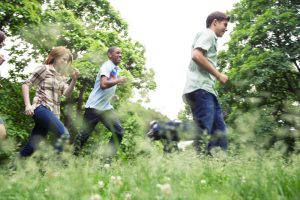 When troubled teens face obstacles affecting their emotional, mental, and physical well-being, sending them to therapy and counseling might not be enough. What may work even more efficiently is incorporating physical activity and outdoor experiences into their routine.
Physical exercise and time spent in nature can significantly improve mental health, boost self-esteem, and teach teens the skills that support emotional growth. Sports and nature also keep these teens physically healthy so they can withstand the hormonal changes experienced during puberty. This way, they can regulate their emotions more easily.
Let's explore how physical activity and outdoor experience can be powerful tools in helping troubled teens.
When troubled teens face obstacles affecting their emotional, mental, and physical well-being, sending them to therapy and counseling might not be enough. What may work even more efficiently is incorporating physical activity and outdoor experiences into their routine.
Physical exercise and time spent in nature can significantly improve mental health, boost self-esteem, and teach teens the skills that support emotional growth. Sports and nature also keep these teens physically healthy so they can withstand the hormonal changes experienced during puberty. This way, they can regulate their emotions more easily.
Let's explore how physical activity and outdoor experience can be powerful tools in helping troubled teens.
How Physical Activity and Outdoor Experiences Benefit Troubled Teens
The main benefits of physical activity for teens are both physical and mental.The advantages of physical activity
- Physical health benefits: Improved health, of course, is one of the top benefits. Regular exercise builds strength, endurance, and fitness. For teens who struggle with low energy or self-confidence, physical activities can get them stronger and more capable. These exercises—bike rides, hiking, sports games—help them feel better physically.
- Mental health benefits: Exercise also plays a vital role in mental well-being. Physical activity reduces symptoms of anxiety and depression as the brain releases endorphins during exercise. This boosts their mood, making them feel more positive. Exercising also provides an outlet for stress where teens can release pent-up energy productively. This, in turn, improves their emotional state and helps them cope with negative feelings.
Outdoor experiences as therapeutic tools
- Nature's calming effect: Spending time in nature can be a powerful tool for helping troubled teens. A walk in the park or simply sitting by the stream, for example, helps teens feel more at ease and grounded. Many peaceful environments allow them to reflect, de-stress, and take time off from the pressures of daily life. Nature creates a space for mental clarity, which supports emotional healing.
- Adventure in team-building: Outdoor activities have the added benefit of providing experiences that require teamwork, communication, and trust. Things like camping and rowing, for instance, give these teens the chance to navigate the outdoors with friends. Those who struggle with trust or social interaction can practice their communication skills and strengthen bonds with their peers. This will lead them to build confidence in their abilities.
Integrating Physical Activity and Outdoor Experiences into Therapy
Structured outdoor programs have combined physical activity, therapeutic guidance, and nature. These programs use outdoor activities to help troubled teens overcome personal struggles. Moreover, they help develop important life skills. Some examples of these structured outdoor programs are:- Adventure programs: These programs may include activities like hiking, kayaking, or rock climbing designed to challenge the teen physically and emotionally. The teens can build resilience, confidence, and leadership skills from the activities.
- Equine therapy: Teens interacting with horses in an outdoor setting is a popular form of therapy. Horses are sensitive animals; working with them requires patience and empathy. Teens often find the connection with the horses can help them open up about their feelings in a non-threatening way.
- Wilderness therapy: This is a method that immerses teens in remote outdoor environments. The idea is to remove teens from their daily distractions and let nature help them focus on self-reflection and emotional growth. This kind of therapy provides a safe space to explore their struggle while learning valuable survival and team-building skills.


Leave a Reply